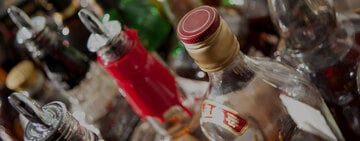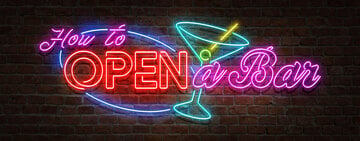How to Make Hard Seltzer the Easy Way
Gone are the boring barroom days of customers ordering simple bottles of beer and glasses of red wine. Now, you’ll see a range of craft beers with artistic labels and designer cocktails. Perhaps the most popular drinks showing up in modern bars are sleek, lean cans of hard seltzer. Stocking cans of hard seltzer has become essential, but why only supply canned hard seltzer brands when you can produce your own with ingredients you already have on hand?
Hard seltzer is one of 2020's top bar trends. Restaurants, taprooms, and pubs can increase their profits by tapping into hard seltzer's popularity and making their own hard seltzer. We’ve created a guide explaining what hard seltzer is, why it’s so profitable, and how you can easily make it yourself.
Click the link below to jump ahead and learn how to make hard seltzer the easy way.
What Is Hard Seltzer?
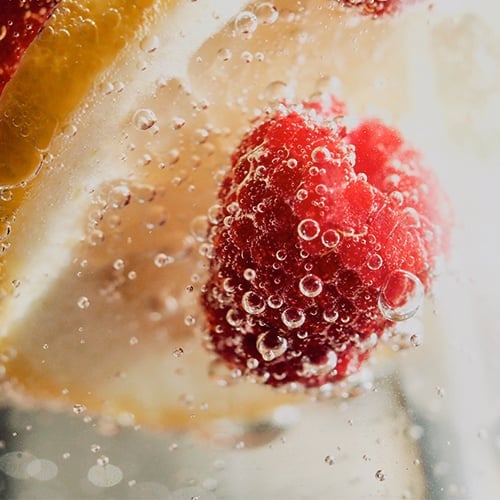
By definition, the only requirement for a beverage to be a hard seltzer is that it contains seltzer water and alcohol. However, specialty brewing markets have popped up to develop the most popular brands and forms of hard seltzer you find in stores.
With seltzer water being an essential hard seltzer ingredient, it’s helpful to understand what the various forms of sparkling water are and how they are developed.
- Sparkling/Carbonated Water: These are generic terms used to describe any bubbling water.
- Seltzer: Seltzer is artificially carbonated, plain water made by dissolving carbon dioxide. This process raises the pH balance.
- Club Soda: Like seltzer, club soda is an artificially carbonated water made by dissolving carbon dioxide. Club soda also contains potassium and/or sodium salts to combat the carbon dioxide's acidic taste.
- Soda Water: Commonly used to describe the water that comes from a bar's soda gun, soda water rarely contains added salts. However, soda water can be used to describe both club soda and seltzer water.
- Sparkling Mineral Water: Sparkling mineral water comes from natural springs filled with sulfur and minerals which organically carbonate it. Sparkling mineral water has both the most distinctive taste and the highest cost of all the sparkling waters, making it an undesirable choice for crafting housemade hard seltzer beverages.
What Kind of Alcohol Is in Hard Seltzer?
Most popular hard seltzer brands do not contain liquor. Usually, the alcohol found in hard seltzer is produced by fermenting cane sugar. Unfermented varieties of hard seltzer require a 40 proof liquor. Vodka is a versatile option. White rum and tequila are alternative choices for enticing those who don’t favor vodka.
Benefits of Making Your Own Hard Seltzer
You can turn a major profit by making your own hard seltzer with the ingredients already stocked in your restaurant or bar. Here are the top benefits of making your own hard seltzer.
- Cost-Effective: Making your own hard seltzer with the ingredients you have on hand (ex. the soda water from your soda gun) is far more cost-effective than stocking up on cans of hard seltzer.
- Customizable Flavors: Offer customers a list of customizable hard seltzer flavor combinations. Not only will customers enjoy designing their own hard seltzer, but you can also upcharge for this experience.
- Simplify Inventory Management: Eliminate the guesswork of estimating how much hard seltzer you need to stock and avoid running out of supplies by making your own.
How Hard Seltzer Is Made
Most canned varieties of hard seltzer are produced by fermenting cane sugar and then adding carbonation and flavors. Unlike the simple vodka soda, brewing hard seltzer is as complex as creating craft beer with the additional challenges of filtering water to achieve clarity, carbonating, and aroma stripping to remove strong acid and sulfur flavors. On average, from scratch hard seltzers undergo five filtration steps and a flavoring process before they are ready to serve. However, you can update the classic vodka soda recipe to dupe brewed varieties of hard seltzer.
Easy Hard Seltzer Recipe
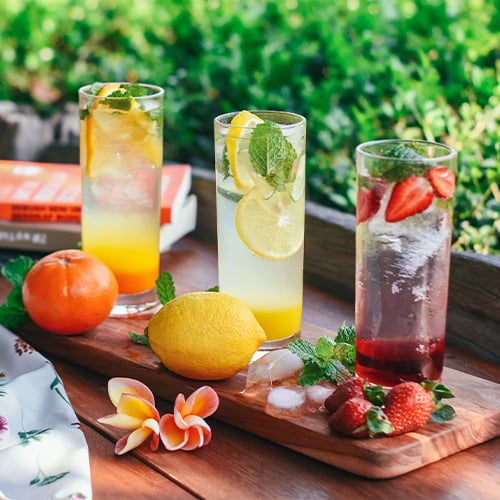
We’ve simplified the hard seltzer making process so your business can tap into the profitable hard seltzer market without expensive equipment or labor-intensive steps. Just adding liquor to soda water won’t yield the flavor hard seltzer fans seek. Here are a few things to keep in mind when you make your hard seltzer.
- The average hard seltzer ABV is 5%.
- Recognizable hard seltzer brands include citric acid in their recipes for a slight zing.
- The average hard seltzer is 100 calories.
- Patrons will choose your signature hard seltzer over familiar canned varieties if you create pretty presentations and personalized experiences with homemade cocktail bitters and fruit juices.
Basic Housemade Hard Seltzer Ingredient Ratios:
- 12 oz. of soda water: While traditional hard seltzers use seltzer water, you can use the soda water from your bar’s soda gun without noticeably altering the hard seltzer flavor profile guests expect.
- 1.78 oz.of 40 proof liquor: Vodka is an easily adaptable choice.
- Up to 1-2 drops of flavored extracts: Fruit flavors are popular.
- .25 oz of fruit juice.
- A tiny pinch of citric acid powder.
- Add cocktail bitters to enhance your hard seltzer's flavor profile. Choose the appropriate quantity for achieving your desired flavor.
Why People Drink Hard Seltzer
Over the last few years, consumers have taken an interest in finding less sugar and calorie-laden alternatives to their favorite foods and beverages. Hard seltzer has emerged as an appealing alcoholic beverage choice for today's health-minded market. Offering a housemade hard seltzer allows you to accommodate gluten-sensitive patrons and add a calorically lighter item to your bar menu. Here are the top reasons why people drink hard seltzer.
- Calorie-Conscious: Most hard seltzers contain approximately 2 grams of carbohydrates, 100 calories, and 5% ABV in a 12 oz. serving.
- Convenient: Most hard seltzer drinkers appreciate that it comes in convenient, ready-to-consume cans. Consider serving your signature hard seltzer in to-go cups and including it in your alcohol delivery and takeaway service.
- Affordable Luxury: Thanks to the sleek designs and attractive branding most hard seltzer brands use, hard seltzer has gained a reputation as an affordable luxury for those who enjoy active and social lifestyles.
- Gluten-Free and Comparatively Hydrating: For gluten-sensitive patrons, hard seltzer is a low ABV, easy-to-drink alternative to beer. Additionally, hard seltzer trumps beer as an outdoor patio dining beverage option, because it is far more hydrating.
Hard Seltzer vs Beer
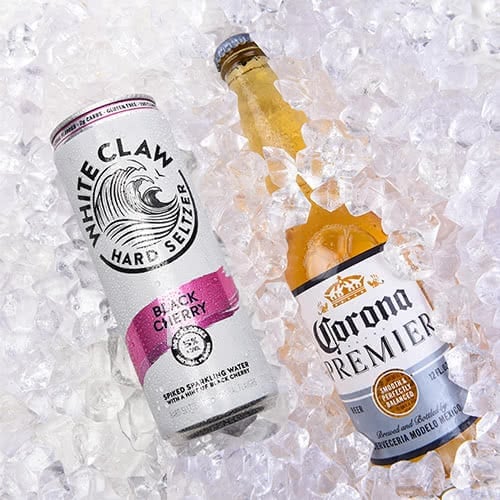
According to a 2020 Nielsen report, weekly hard seltzer sales have surpassed every other member of the pale ale beer category. 51% of people who identified as hard seltzer drinkers reported that they now actively choose hard seltzers over their previous alcoholic beverage of choice. Of those who used to order a beer at restaurants and bars, 52% now purchase hard seltzer.
While market analyzers expected hard seltzer’s popularity to dive during colder months, it maintained a 5% hold on the retail beer sales category throughout the fall and winter in 2019. While hard seltzer and beer share enough commonalities to be looked at side by side in a research report, they aren’t synonymous. In this section, we’ll explore the similarities and differences between hard seltzer and beer.
Hard Seltzer and Beer’s Similarities
- Undergo a fermentation process
- Low ABV
- Cheaper than cocktails/liquors
- Carbonated
Hard Seltzer and Beer’s Differences
- Hard Seltzer is lower in calories than beer.
- While there are many unique types of beer, each possesses a strong flavor profile, whereas hard seltzers offer just a hint of flavor.
- Beer contains gluten, and hard seltzer does not.
- While both hard seltzer and beer are carbonated, carbonation is the defining feature of hard seltzer whereas beer is only slightly carbonated.
What Is Seltzer Beer?
Seltzer beer is a form of hard seltzer that uses malted barley rather than fermented cane sugar. Its appeal isn’t as universal as fermented cane sugar hard seltzer options because it is not gluten-free. Additionally, many seltzer beers contain more added sugars than their fermented cane sugar counterparts, increasing their calorie count and losing their target audience, which primarily chooses hard seltzer drinks as a calorie-conscious alternative. If they’re going to indulge in a higher calorie option, most customers would rather have a good craft brew than a seltzer beer.
In-house hard seltzers can be customized and upcharged while remaining very inexpensive to produce. We've crafted a hard seltzer recipe that uses ingredients you already have on hand. Use our recipe as the baseline for your own signature hard seltzer and watch your profits soar.

